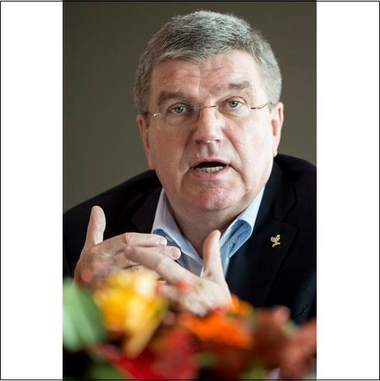Olympics proposes non-discrimination language

Lausanne, Switzerland (AP) — Breaking from the tradition of awarding the Olympics only to a single host city, the IOC is opening the door to possible wider bids — including bids from an entire country, joint bids from more than one city and even the possibility of events held in more than one country.
The possibility of new types of bids was among the 40 recommendations released Tuesday as part of International Olympic Committee President Thomas Bach's reform agenda, his drive to make the bidding process and the games themselves more attractive and less costly.
"We want to create more diversity in the candidatures," Bach told a small group of reporters at the Olympic Museum in Lausanne. "There is no one-size-fits-all solution."
Bach's proposals also include scrapping the current limit of 28 sports for the Summer Games to allow for new events to come in while maintaining a limit of 10,500 athletes and 310 medal events. For the Winter Games, the proposed limit is 2,900 athletes and 100 medal events.
The proposals would allow host cities to propose the inclusion of one or more events for their games — a move which would clear the way for baseball and softball to be included in the 2020 Tokyo Olympics. Both sports were dropped from the Olympics after the 2008 Beijing Games, but are highly popular in Japan.
The package also includes measures for revamping the bid process to make it more of a partnership with candidates, creating a digital Olympic television channel to promote Olympic sports in the years between the games, and including language on non-discrimination on sexual orientation in the Olympic Charter and host city contract.
The move to change the wording of the IOC's Principle 6 follows the international outcry that erupted before the 2014 Winter Games in Sochi over a Russian law prohibiting gay "propaganda."
The proposed new clause states: "The enjoyment of the rights and freedoms set forth in the Olympic Charter shall be secured without discrimination of any kind, such as race, color, sex, sexual orientation, language, religion, political or other opinion, national or social origin, property, birth or other status."
The proposals also call for the appointment of an IOC "compliance officer" on ethics and a slight tweak to the 70-year age limit for IOC members. A member's term could be extended to the age of 74 if approved by the IOC, with no more than five cases at a time.
The reforms, called "Olympic Agenda 2020," will be put to a vote by the full IOC at a special session in Monaco on Dec. 8-9. Barring any surprise, most or all the recommendations are expected to be passed.
"It's like a jigsaw puzzle," Bach said.
The pressure for change to the bidding process has grown following the troubled race for the 2022 Winter Games. Scared off by the reported $51 billion associated with the Sochi Games, several cities pulled out of the bidding, leaving only Beijing and Almaty, Kazakhstan, in the running.
"More must be done to alleviate concerns regarding the costs and impacts of hosting the Olympic Games," the IOC document said.
Under the proposals, the IOC will allow "the organization of entire sports and disciplines outside the host city or, in exceptional cases, outside the host country notably for reasons of geography and sustainability."
That would be a first for the Summer Games. The IOC rules already allow for events to be held in a bordering country for the Winter Games.
In the Summer Olympics, some events — such as sailing and many of the preliminary-round football matches — are already held outside host cities. But Bach said the IOC is now ready to open the chance for country-wide and joint bids.
"In the Summer Games, it's more about small or neighboring countries where you have distances which are manageable and feasible," he said. "We want to have more diversity, to give smaller countries the opportunity to organize games."
There has been a precedent for holding events outside the host country. Because of quarantine laws in Australia, the equestrian competition for the 1956 Melbourne Olympics was held in Stockholm.
Bach stressed there still should be a "main organizing city" with an athletes village that serves as the center of the Olympic experience.
"We want the games with the unity of time, place and action," he said.
Other recommendations include:
n broad review of the Youth Olympics, which debuted in Singapore in 2010. Moving the Youth Games to non-Olympic years, meaning the 4th Summer Youth Games would be switched from 2022 to 2023.
n creation of a "register" of consultants and lobbyists eligible to work for bid cities. Currently, bid cities have been spending millions of dollars on consultant groups.
by Stephen Wilson, AP Sports Writer
Copyright 2014 The Associated Press. All rights reserved. This material may not be published, broadcast, rewritten or redistributed.
The Gayly – November 18, 2014 @ 9:30am





